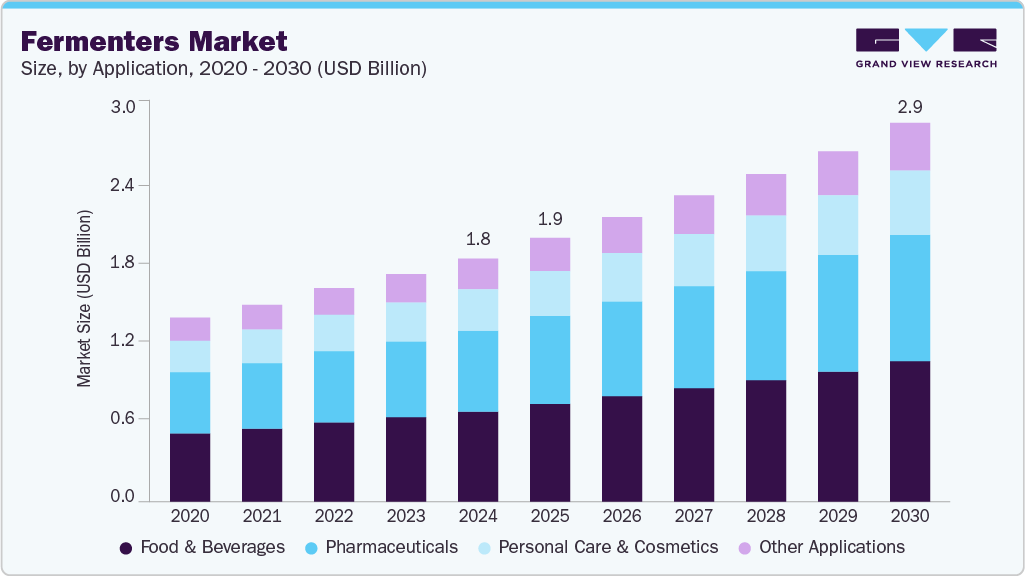Fermenters Market 2030: A Deep Dive into Application Segments
The global fermenters market was valued at USD 1.83 billion in 2024 and is projected to reach USD 2.97 billion by 2030.
The global fermenters market was valued at USD 1.83 billion in 2024 and is projected to reach USD 2.97 billion by 2030, growing at a CAGR of 8.4% between 2025 and 2030. This growth is largely driven by the increasing prevalence of chronic diseases such as cancer, cardiovascular disease, diabetes, and hypertension, which has led to a heightened focus on developing advanced biological therapies.
The growing demand for monoclonal antibodies and personalized medicines has significantly boosted bioproduction, in turn accelerating the need for high-performance fermenters. The integration of advanced technologies to streamline complex manufacturing processes is further fueling market demand. Additionally, major biopharmaceutical firms are making substantial investments in research and development, which continues to support market expansion.

Fermenters are vital in providing controlled environments for the cultivation of microorganisms or for the production of bioactive substances derived from them. These systems are widely used to support the growth and maintenance of bacterial and fungal populations, essential in numerous biotechnological and pharmaceutical processes.
A primary growth driver is the expanding biopharmaceutical sector, where microbial fermentation plays a key role in the production of vaccines, enzymes, and antibodies. According to the World Health Organization (WHO), biologics now make up a significant portion of the pharmaceutical pipeline, underlining the increasing importance of fermentation processes in modern drug development. This growing demand has led to a rising need for advanced fermenter systems that ensure scalability, sterility, and compliance with regulatory standards.
Order a free sample PDF of the Fermenters Market Intelligence Study, published by Grand View Research.
Key Market Trends & Insights
- Europe led the global fermenters market in 2024 and is expected to grow at a strong pace through 2030. This leadership is supported by technological advancements in fermenter design and innovations in the food and beverage sector, including the rise of cultured and plant-based meat.
- By application, the food and beverage segment held a dominant market share in 2024, driven by the increased use of fermenters in brewing, winemaking, and baking. In breweries, fermenters convert wort into beer, while in wineries, they are used for grape juice fermentation.
- By mode of operation, the automatic segment accounted for the largest share in 2024. This is due to its high efficiency, precision, and ability to ensure consistent fermentation conditions, resulting in uniform product quality across production batches.
- By microorganism source, the bacteria segment led the market in 2024. This dominance is attributed to bacteria’s capacity for targeted metabolic functions and the production of diverse compounds such as enzymes, antibiotics, organic acids, vitamins, and biofuels, essential across various industries.
- By process, the fed-batch segment was the market leader in 2024. This approach offers better control over nutrient delivery and fermentation parameters, maximizing both cell density and product yield. Its scalability and reduced substrate inhibition make it the preferred process in biopharmaceutical and enzyme manufacturing.
Market Size & Forecast
- 2024 Market Size: USD 1.83 Billion
- 2030 Projected Market Size: USD 2.97 Billion
- CAGR (2025-2030): 8.4%
- Europe: Largest market in 2024
Key Companies & Market Share Insights
The global fermenters market is highly fragmented, with ongoing innovation and expansion driven by sustainability objectives, advanced materials, and improvements in process efficiency. Leading companies are concentrating on building next-generation fermenters that enhance production efficiency, reduce energy consumption, and align with regulatory compliance.
- Eppendorf AG remains a leader in bioprocess innovation with its automated single-use fermenters, which enhance operational efficiency while minimizing contamination risks. The company emphasizes energy efficiency and sustainability, incorporating circular economy principles into product development.
- Sartorius AG has strengthened its market presence by expanding its bioreactor and fermenter offerings, especially through strategic acquisitions that bolster its capabilities in single-use technologies and analytics. The company’s flexible and customizable systems address rising demand in pharmaceuticals, biotech, and food sectors, reinforcing its position as a key provider of high-performance, sustainable fermentation solutions.
Key Players
- Eppendorf AG
- Sartorius AG
- Pierre Guerin SAS
- Applikon Biotechnology BV.
- GEA Group
- Cercell APS
- ElectroLab Biotech Ltd.
- Zeta Holding GmbH
- Thermo Fisher Scientific Inc.
- New Brunswick Scientific Co., Inc.
Explore Horizon Databook – The world's most expansive market intelligence platform developed by Grand View Research.
Conclusion
The global fermenters market is set for strong growth, fueled by rising demand for biological therapies, innovations in personalized medicine, and the rapid expansion of the biopharmaceutical and food sectors. With microbial fermentation playing an essential role in the development of biologics and functional foods, the need for scalable, automated, and precise fermenter systems will continue to grow. Europe is currently the largest regional market, supported by technological innovation and sectoral advancement. Moving forward, continuous R&D, sustainability efforts, and improvements in fermentation technology will shape the future of this dynamic and increasingly vital industry.